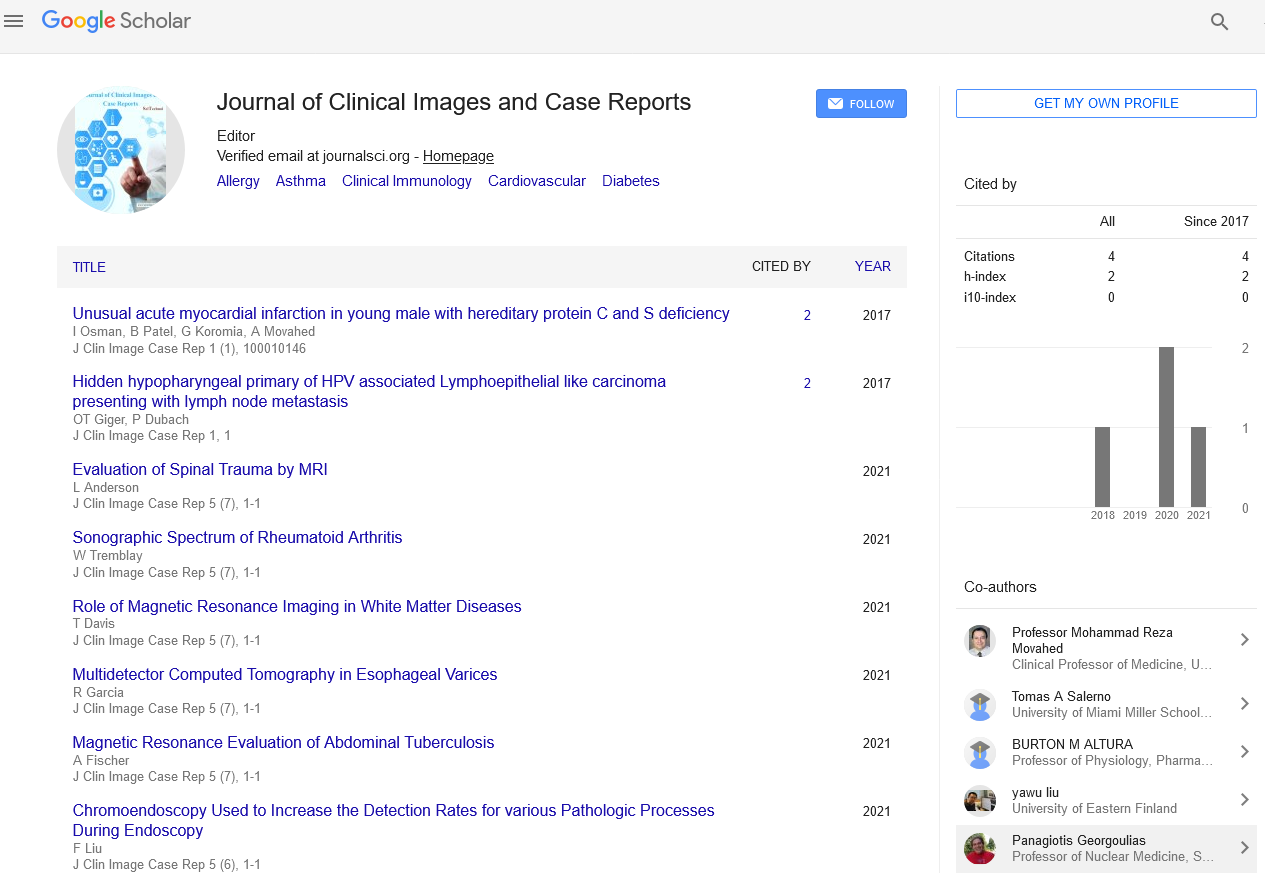Opinion Article, J Clin Image Case Rep Vol: 7 Issue: 1
Asthma and Clinical Immunology Urology he Interplay of Allergies, Asthma, and Urological Condition
Refiloe Strachan*
Department of Immunology, St George's, University of London, London, UK
*Corresponding Author: Refiloe Strachan
Department of Immunology, St
George's, University of London, London, UK
E-mail: strachanrefiloe@gmail.com
Received date: 27 January, 2023, Manuscript No. CICR-23-95480;
Editor assigned date: 30 January, 2023, PreQC No. CICR-23-95480(PQ);
Reviewed date: 14 February, 2023, QCNo CICR-23-95480;
Revised date: 21 February 2023, Manuscript No. CICR-23-95480(R);
Published date: 28 February 2023 DOI: 10.4172/CICR.1000237.
Citation: Shahin M (2023) Asthma and Clinical Immunology Urology: The Interplay of Allergies, Asthma, and Urological Condition. J Clin Image Case Rep 7:1.
Description
Asthma and allergies are common conditions that affect millions of people worldwide. Asthma is a chronic respiratory condition characterized by inflammation of the airways, leading to symptoms such as wheezing, coughing, chest tightness, and shortness of breath. Allergies, on the other hand, occur when the immune system overreacts to harmless substances, known as allergens, resulting in a wide range of symptoms. Both asthma and allergies are closely related and often coexist, with allergens being a common trigger for asthma symptoms. In addition, there is emerging evidence that suggests a potential link between asthma, allergies, and urological conditions. In this article, we will explore the interplay of allergies, asthma, and urological conditions, including their relationship, causes, symptoms, diagnosis, treatment, and prevention.
Relationship between asthma, allergies, and urological conditions: research studies have shown that there may be a link between asthma, allergies, and urological conditions. Asthma and allergies are both inflammatory conditions, and the inflammation caused by these conditions may affect the urological system as well. Studies have found that individuals with asthma and allergies may have an increased risk of developing urological conditions, such as urinary incontinence, interstitial cystitis, and bladder pain syndrome. The exact mechanisms underlying this relationship are not yet fully understood, but it is believed that the inflammation associated with asthma and allergies may also affect the tissues of the urological system, leading to urological symptoms.
Causes of asthma, allergies, and urological conditions
The exact causes of asthma, allergies, and urological conditions are complex and multifactorial, involving a combination of genetic, environmental, and lifestyle factors.
Asthma: Asthma is believed to be caused by a combination of genetic and environmental factors. Individuals with a family history of asthma are at an increased risk of developing asthma themselves, indicating a genetic predisposition to the condition. Environmental factors, such as exposure to allergens, pollution, respiratory infections, and tobacco smoke, can also trigger asthma symptoms.
Allergies: Allergies are caused by the immune system's overreaction to normally harmless substances, known as allergens. Genetic factors play a role in the development of allergies, with a family history of allergies increasing the risk of developing allergies. Environmental factors, such as exposure to allergens, pollution, changes in climate, and lifestyle factors, such as diet and hygiene practices, may also influence the development of allergies.
Urological conditions: Symptoms of urological conditions can vary depending on the specific condition. Urinary incontinence may cause symptoms such as unintentional leakage of urine, frequent urination, urgency, and nocturia (frequent urination at night). Interstitial cystitis and bladder pain syndrome may cause symptoms such as pelvic pain, discomfort or pressure in the lower abdomen, frequent urination, urgency, and pain or discomfort during sexual intercourse.
Diagnosis of asthma, allergies, and urological conditions
The diagnosis of asthma, allergies, and urological conditions typically involves a thorough medical history, physical examination, and various diagnostic tests.
Asthma: The diagnosis of asthma may include lung function tests, such as spirometry, to measure the airflow in the lungs, and bronchial challenge tests, to determine the sensitivity of the airways to certain triggers. Allergy testing may also be done to identify specific allergens that may trigger asthma symptoms.
Allergies: The diagnosis of allergies may involve skin prick tests or blood tests to identify specific allergens that may be causing allergic reactions. A detailed medical history and physical examination may also be done to determine the triggers and severity of allergic symptoms.
Asthma: The treatment of asthma may include medications such as inhaled corticosteroids, long-acting bronchodilators, short-acting bronchodilators for quick relief of symptoms, and other medications depending on the severity of the condition. Lifestyle changes, such as avoiding triggers, quitting smoking, and improving indoor air quality, may also be recommended. In some cases, allergy shots (immunotherapy) may be recommended to reduce the sensitivity to allergens.
Urological conditions: The diagnosis of urological conditions may involve various tests, depending on the specific condition. These may include urine tests, imaging studies such as ultrasound, CT scan, or MRI, urodynamic tests to assess bladder function, cystoscopy to visualize the bladder and urethra, and biopsy of the bladder or urethra in certain cases.
 Spanish
Spanish  Chinese
Chinese  Russian
Russian  German
German  French
French  Japanese
Japanese  Portuguese
Portuguese  Hindi
Hindi 